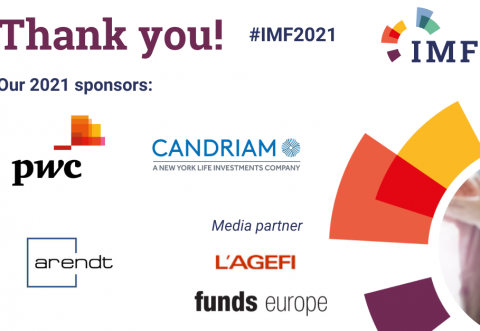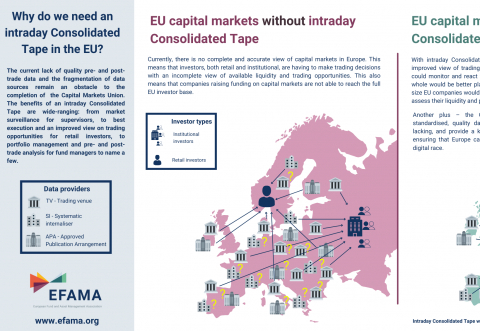Capital Markets Union
Building a Capital Markets Union (CMU) serving the needs of European citizens and businesses is as ambitious as it is essential: the effort will enable pensioners and savers to share in the upside of Europe’s economic recovery. In the process, European capital markets also become more efficient and better integrated. This long-term vision is key to financing European innovation and to supporting the transition towards a more sustainable economy.
Increasing retail investors’ participation in capital markets is an essential component for building an effective CMU. Improving access to financial and non-financial information and addressing the high data costs our industry is encountering, are also important steps towards a functioning CMU. All this, while maintaining and improving the attractiveness of the European investment management sector in today's global environment.
EFAMA prepared a list of key actions that are required to reach the CMU objectives from an investor perspective. We have also developed a specific Key Performance Indicator to measure year-on-year progress towards increasing retail participation in capital markets in each member state.
EFAMA’s comments on the European Commission’s proposal for a Regulation on a pan-European personal pension product (PEPP)
The PEPP - Engaging the young generation of European savers
EFAMA Response to EC Consultation: Capital Markets Union mid-term review 2017
• EFAMA reiterates the European asset management industry’s strong support for the CMU project in all its dimensions. We welcome the range of initiatives, from the overarching aim of rebuilding confidence in financial markets by putting investors’ interests at the heart of the project, to the promotion of market-based financing of the economy, the development of a PEPP or the development of a comprehensive strategy on sustainable finance.
Thank you to the Investment Management Forum sponsors | Register now!
Register now for our Investment Management Forum next week! High-calibre panels and keynote speakers promise rich, informative and thought-provoking exchanges between European policymakers, investment managers and regulators on
- the Competitiveness of our industry
- the EU retail investment strategy
- the latest in global standards for sustainability reporting
- challenges and opportunities of alternative investment regulations
- the impact of digitalisation on asset management
- and more...
Statement on the release of the Oliver Wyman study ‘Caught on Tape’
“Oliver Wyman’s study ‘Caught on Tape’ provides a perplexing take on Consolidated Tape for Europe. Sure enough, it starts with accurate observations: the high number of trading venues in Europe, the resultant fragmented liquidity, unseen liquidity due to the lack of a consolidated tape, and the fact that leading markets like the US and Canada today benefit from a real time consolidated tape.
Visual | Why do we need a real-time Consolidated Tape in the EU?
The current lack of quality pre- and post-trade data and the fragmentation of data sources remain an obstacle to the completion of the Capital Markets Union. The benefits of a real-time Consolidated Tape are wide-ranging: from market surveillance for supervisors, to best execution and an improved view on trading opportunities for retail investors, to portfolio management and pre- and post-trade analysis for fund managers to name a few.
Charting the Course: Unlocking Retail Participation in EU Capital Markets
At the Roundtable on the distribution of retail investment products on 18 July 2023, the European Commissioner for Financial Stability, Financial Services and Capital Markets Union, Mairead McGuinness, invited the European Banking Federation (EBF), the European Fund and Asset Management Association (EFAMA) and Insurance Europe to advance an industry-driven process to explore common solutions aimed at increasing retail participation in EU capital markets.
The Capital Flywheel
The European Capital Markets Report is a joint initiative authored by Oliver Wyman and co-developed by EFAMA, the European Banking Federation (EBF) and the Federation of European Securities Exchanges (FESE). This report reviews progress made towards the CMU and provides recommendations on how to improve the competitiveness of European capital markets.
Unlocking private investment to fund Europe's triple transitions
EFAMA’s publication lays out the asset management sector’s policy priorities for the next five years, building on the in-depth expertise of our members. This includes practical recommendations for keeping Europe competitive and developing deeper, more integrated and liquid capital markets in Europe.
The recommendations focus around four main objectives:
































